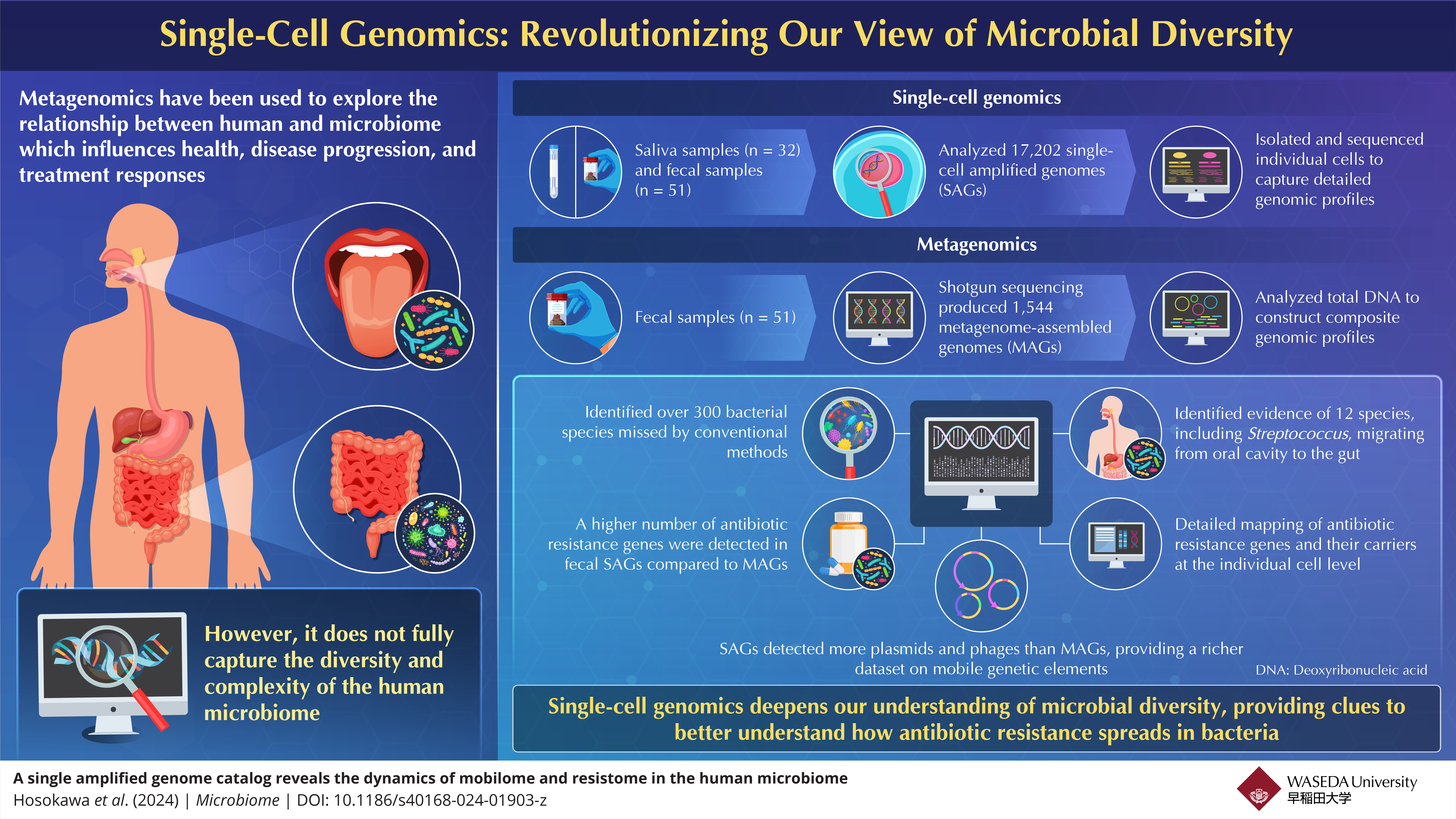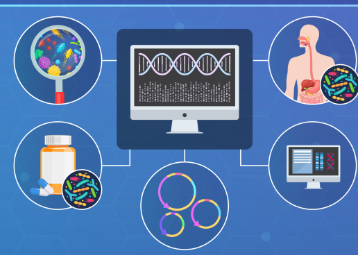Decoding Bacterial Genomes Using Single-Cell Genomics
Mon, Oct 7, 2024-
Tags
Decoding Bacterial Genomes Using Single-Cell Genomics
Researchers leverage advanced single-cell genomics to uncover new bacterial species and map antibiotic resistance
Metagenomics, a conventional approach to study genetic material of microorganisms, has been widely used to study the relationship between microbes in the human body and humans. However, it does not provide detailed information on the diversity of microbes. Now, researchers have developed a new single-cell genome approach to explore microbes in humans, which are closely related to health and disease. This cutting-edge approach can help tackle the global problem of antibiotic resistance to improve public health.

Image title: Exploring the relationship between humans and microbes using new single-cell genome technique
Image caption: Researchers have now developed a new single-cell genome technique to understand how bacteria interact and exchange genetic material, including antibiotic resistance genes at the individual cell level.
Image credit: Dr. Masahito Hosokawa from Waseda University, Japan
License type: Original content
Usage restrictions: Cannot be reused without permission
The human microbiome plays a critical role in our health, influencing everything from disease development to treatment responses. This connection has captured the attention of scientists worldwide, eager to unlock its secrets. While traditional metagenomics has provided valuable insights, it falls short in resolving microbial diversity at the strain level and accurately profiling genes involved in antibiotic resistance. These limitations highlight the need for more advanced approaches.
To address this, a team of researchers led by Associate Professor Masahito Hosokawa, from Waseda University, in collaboration with bitBiome, Inc., developed a groundbreaking single-cell genome approach. This approach, which reads information from individual cells, offers a promising alternative to conventional metagenomics. This study, published in Microbiome, explores the microbial diversity and genetic features using single-cell genomic analysis.
“The limitation of metagenomics inspired us to develop a new approach to explore the human microbiome at the single-cell level. This singe-cell genome approach can enhance our understanding of how bacteria interact and exchange genetic material including antibiotic resistance genes, providing deeper insights into human health and disease,” says Hosokawa.
The researchers conducted a large-scale individual analysis of microbes in the human body. For this, they recruited 51 participants and collected their saliva and fecal samples. They then performed a new single-cell genome analysis method called SAG-gel technology, commercialized as bit-MAP® by bitBiome, Inc. In this technique, individual bacteria were enclosed in a gel and their genomes were amplified and analyzed individually.
The researchers recovered genomes of 300 bacterial species using this novel technique which were missed by the conventional method. In addition, the new technique provided deeper insights into antibiotic resistance genes, gene exchange networks, bacterial interaction, and diversity.
“Our study analyzed 30,000 individual genomes of oral and intestinal bacteria, which is the world’s largest genome dataset, showcasing the power of single-cell genomics in elucidating microbial diversity and interactions,” says Hosokawa.
The findings of this study have several potential applications. In public health, the detailed profiling of antibiotic resistance genes can help develop more targeted and effective treatment strategies. This in turn can help prevent diseases, reduce healthcare costs, and improve public health. In environmental monitoring, single-cell genomics can track genetic shifts across ecosystems to manage and prevent the spread of antibiotic resistance. In the agricultural sector, understanding antibiotic resistance gene dynamics can guide practices to minimize resistance spread through soil, water, and livestock.
The study highlights the transformative potential of single-cell genomics in microbiome research, offering a more detailed and nuanced understanding of microbial communities.
“Our approach provides clues to better understand how antibiotic resistance spreads in bacteria and has potential for future medical and public health applications,” concludes Hosokawa.
Reference
Title of original paper: A Single Amplified Genome Catalog Reveals the Dynamics of Mobilome and Resistome in the Human Microbiome
DOI: https://www.doi.org/10.1186/s40168‑024‑01903‑z
Journal: Microbiome
Article Publication Date: 2 Oct. 2024
Authors:Tetsuro Kawano‑Sugaya1, Koji Arikawa1,2, Tatsuya Saeki1, Taruho Endoh1, Kazuma Kamata1, Ayumi Matsuhashi1, and Masahito Hosokawa1,2,3,4,5*
Affiliations:
1bitBiome, Inc., Japan
2Department of Life Science and Medical Bioscience, Waseda University, Japan
3Computational Bio Big-Data Open Innovation Laboratory, National Institute of Advanced Industrial Science and Technology, Japan
4Institute for Advanced Research of Biosystem Dynamics, Waseda Research Institute for Science and Engineering, Japan
5Research Organization for Nano and Life Innovation, Waseda University, Japan
About Associate Professor Masahito Hosokawa
Dr. Masahito Hosokawa is an Associate Professor at Waseda University and the Chief Scientific Officer at bitBiome, Inc. He earned his Ph.D. in Engineering from Tokyo University of Agriculture and Technology. With over a decade of experience, he has authored numerous publications, focusing on single-cell analysis, genomics, and microfluidics. He has received several prestigious awards, including the Young Scientists’ Award by MEXT in 2019 and the Minister’s Award under the Award for Academic Startups 2022 program.














